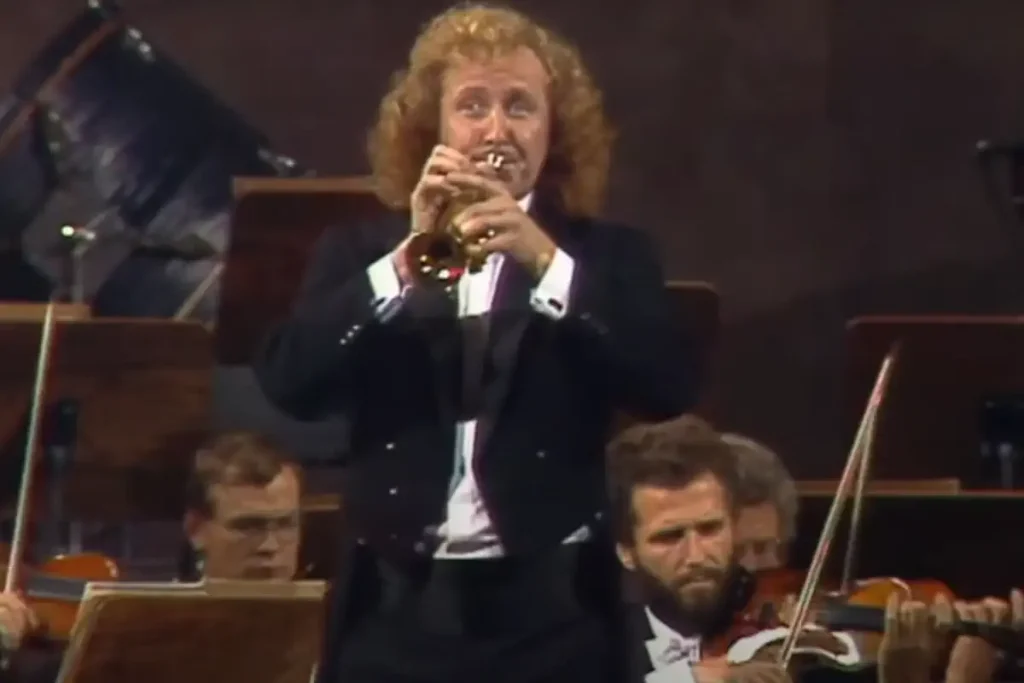Accompanied by the Bavarian Radio Symphony Orchestra (Symphonieorchester des Bayerischen Rundfunks), the German trumpeter Reinhold Friedrich performs Georg Philipp Telemann’s Trumpet Concerto in D major, TWV 51:D7. Conductor: Reinhard Peters. This performance was recorded on September 2, 1986, during the 35th ARD International Music Competition, where Reinhold Friedrich won the second prize in the trumpet competition.
Georg Philipp Telemann’s Trumpet Concerto in D major, TWV 51:D7
Georg Philipp Telemann’s Trumpet Concerto in D-major, TWV 51 is a brilliant showcase of Baroque trumpet virtuosity and musicality. Written in the early 18th century, the concerto exemplifies Telemann’s ability to blend intricate musical lines with clear, vibrant melodies. The piece is composed for solo trumpet, strings, and continuo, and it stands out for its lively character and technical demands on the soloist. The bright key of D major, traditionally favored for trumpet music, allows for a brilliant and resonant sound that highlights the trumpet’s capabilities.
The concerto opens with a majestic movement that sets the stage for the soloist’s display of technical skill and lyrical expression. This is followed by a lyrical and expressive slow movement, providing a beautiful contrast to the lively outer movements. The final movement is a spirited and joyful conclusion, showcasing the trumpet’s agility and the composer’s inventive use of rhythm and melody. Throughout the concerto, Telemann’s writing is characterized by its clarity, elegance, and the effective interplay between the soloist and the ensemble. This work remains a favorite among trumpet players and Baroque music enthusiasts for its charm, technical brilliance, and expressive depth.
The trumpet concerto is in four movements:
- The first movement, marked Adagio, begins with a majestic introduction that allows the trumpet to establish its presence. The movement is characterized by its noble and stately character, with the trumpet leading the ensemble through a series of regal and expansive musical ideas. The strings provide a rich harmonic foundation, supporting the trumpet’s lyrical lines.
- The second movement, Allegro, shifts to a lively and energetic pace. The trumpet engages in a bright and spirited dialogue with the strings, showcasing Telemann’s skill in crafting intricate melodic lines. The movement is marked by its rhythmic vitality and the interplay between the soloist and the ensemble, creating a sense of joyful exuberance.
- The third movement, Grave, offers a poignant contrast with its slow and expressive character. The trumpet’s melodic lines are beautifully lyrical, supported by the strings’ gentle accompaniment. This movement highlights the instrument’s ability to convey deep emotion and the composer’s talent for creating an atmosphere of introspective beauty.
- The final movement, Allegro, brings the concerto to a rousing and jubilant conclusion. The trumpet’s technical prowess is on full display, with rapid passages and brilliant flourishes. The movement is characterized by its lively rhythms and the celebratory interaction between the soloist and the ensemble, ending the concerto on a high and joyful note.
Reinhold Friedrich

Reinhold Friedrich is a highly esteemed German trumpet virtuoso known for his exceptional skill and versatility across a wide range of musical genres. Born on July 14, 1958, in Weingarten, Germany, Friedrich began playing the trumpet at an early age and quickly demonstrated remarkable talent. He pursued formal music education at the Staatliche Hochschule für Musik Karlsruhe and continued his studies with renowned trumpeters such as Pierre Thibaud in Paris.
Friedrich’s career gained significant momentum when he won the second prize in the trumpet category at the prestigious 35th ARD International Music Competition in Munich in 1986. This achievement helped establish him as one of the leading trumpet players of his generation. His performance repertoire spans Baroque, Classical, Romantic, and contemporary music, showcasing his ability to adapt to different styles with ease and sensitivity.
As a soloist, Friedrich has performed with many of the world’s leading orchestras, including the Berlin Philharmonic, Vienna Philharmonic, and London Symphony Orchestra, under the direction of distinguished conductors such as Claudio Abbado, Sir Simon Rattle, and David Zinman. His collaborations extend to chamber music, where he frequently works with esteemed ensembles and musicians.
Friedrich is also an influential educator, holding a professorship at the Staatliche Hochschule für Musik Karlsruhe, where he mentors the next generation of trumpet players. He has given masterclasses worldwide, sharing his expertise and passion for the trumpet with aspiring musicians.
Throughout his career, Friedrich has been committed to expanding the trumpet repertoire, premiering numerous contemporary works and often collaborating with composers to create new music. His discography is extensive, including acclaimed recordings of both traditional and modern trumpet works.
Sources
- Trumpet Concerto, TWV 51:D7 (Telemann, Georg Philipp) on the International Music Score Library Project website